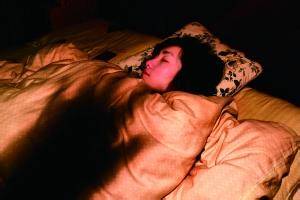It may be easier to blame sleep paralysis on evil spirits because what's actually happening in your brain is much harder to explain.
也許把睡眠癱瘓這種現(xiàn)象歸結(jié)于是因可怕的惡魔們而起更簡(jiǎn)單,因?yàn)檎嬲谌藗兡X海中發(fā)生的事情實(shí)在是太難解釋了。
Modern scientists believe that sleep paralysis is caused by an abnormal overlap of the REM, rapid eye movement, and waking stages of sleep.
當(dāng)代的科學(xué)家認(rèn)為睡眠癱瘓是由于睡眠的 REM 階段(快速動(dòng)眼期)跟清醒階段的非正常交錯(cuò)而引起的。
During a normal REM cycle, you're experiencing a number of sensory stimuli in the form of a dream, and your brain is unconscious and fully asleep.
在一個(gè)正常的快速動(dòng)眼期中,會(huì)經(jīng)歷許多感官刺激,這些刺激以夢(mèng)的形式加以表現(xiàn),但是大腦是完全處于睡眠狀態(tài)并且沒有意識(shí)。
During your dream, special neurotransmitters are released, which paralyze almost all of your muscles.
在你的夢(mèng)中,特殊的神經(jīng)遞質(zhì)被釋放,它們幾乎麻痹了你所有的肌肉。
That's called REM atonia.
這就叫做快速眼動(dòng)期的肌肉遲緩。
It's what keeps you from running in your bed when you're being chased in your dreams.
這也是為什么當(dāng)你夢(mèng)見在被追趕卻不會(huì)真的從床上爬起來跑動(dòng)的原因。

During an episode of sleep paralysis, you're experiencing normal components of REM.
在睡眠癱瘓這種情形中,你會(huì)經(jīng)歷快速動(dòng)眼期的所有正常部分。
Your dreaming and your muscles are paralyzed, only your brain is conscious and wide awake.
你會(huì)做夢(mèng)并且你的肌肉被麻痹,只有你的大腦非常清醒并且有意識(shí)。
This is what causes you to imagine that you're having an encounter with a menacing presence.
這就是讓你產(chǎn)生遇到具有恐怖長(zhǎng)相的人的幻覺的原因。
So this explains the hallucinations, but what about the feelings of panic, strangling, choking, chest pressure that so many people describe?
所以,這解釋了幻覺部分,但是恐慌部分怎么說呢?扼死感,窒息感,胸部的壓迫感這些被很多人描述的感覺?
Well during REM, the function that keeps you from acting out your dreams,
事實(shí)是,在快速動(dòng)眼期,使你睡覺時(shí)不會(huì)真正做出夢(mèng)中行為的這種身體機(jī)能
REM atonia, also removes voluntary control of your breathing.
-快速動(dòng)眼期的肌肉遲緩,也剝奪了你呼吸的自主控制權(quán)。
Your breath becomes more shallow and rapid.
你的呼吸變得更淺、更快。
You take in more carbon dioxide and experience a small blockage of your airway.
你呼入更多的二氧化碳并且經(jīng)歷呼吸通道的微微堵塞。
During a sleep paralysis episode, a combination of your body's fear response to a perceived attack by an evil creature and your brain being wide awake
在睡眠癱瘓這種情形中,你整個(gè)身體的恐懼反應(yīng)聚集成為一種被邪惡生物攻擊的感覺,你的腦子十分清醒,
while your body is in an REM sleep state triggers a response for you to take in more oxygen.
當(dāng)你處于快速動(dòng)眼期的時(shí)候會(huì)觸發(fā)身體機(jī)制以呼入更多的氧氣。
That makes you gasp for air, but you can't because REM atonia has removed control of your breath.
這就使你想要喘息以呼入空氣,但是你不能,因?yàn)榭焖賱?dòng)眼期的肌肉麻痹已經(jīng)剝奪了你控制呼吸的權(quán)利。
This struggle for air while your body sleeps creates a perceived sensation of pressure on the chest or suffocation.
這種當(dāng)你睡著時(shí)身體為呼吸空氣的掙扎產(chǎn)生了一種可以被感知的感覺,這就是胸部壓迫感或者說是胸悶的感覺。
While a few people experience sleep paralysis regularly and it may be linked to sleep disorders such as narcolepsy,
然而一小部分人會(huì)經(jīng)常經(jīng)歷睡眠癱瘓,這也許與一些睡眠紊亂癥有關(guān)比如嗜睡癥,
many who experience an episode of sleep paralysis do so infrequently, perhaps only once in a lifetime.
那些經(jīng)歷睡眠癱瘓的人很偶然也會(huì)產(chǎn)生嗜睡,也許一生中就一次。
So you can rest easy, knowing that an evil entity is not trying to haunt, possess, strangle, or suffocate you.
所以不用擔(dān)心,因?yàn)槟阋呀?jīng)知道那些可怕的東西并不是在嘗試?yán)p上你,占有你,扼死你,或者使你窒息。
Save that for the horror films!
還是把這些想法都留給恐怖電影吧!



